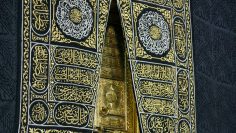Ramadan represents an important time for Muslims. It is a month in which we return ourselves to Allah and the Qur’an. Physically, we abstain from food and water, reminding the body of how little sustenance it needs to thrive. Morally, the Muslim works on improving their character, abstaining from anger, backbiting and obscene language. They guard their ears, eyes, and tongues from engaging in sinful behavior. Spiritually, it is a time of self-reformation and seeking purification from desires (nafs) to bring oneself closer to Allah. We give up the devices of this world (dunya), whether it is our cellphones, music playlists, Netflix subscriptions or social media to bring ourselves in alignment with what Islam asks of us, and in turn, inculcate a deeper sense of God consciousness (taqwa). Before the month even starts, an aura of anticipation and eagerness fills our communities. We circulate lists of goals to be achieved, whether it is increased prayers, recitation of the Qur’an or standing in the night prayer, seeking solace in the company of Allah.
For women, menstruation (hayd) can present a distinct challenge – just as they find themselves settling into a Ramadan routine, they start their cycle and are no longer able to fast or pray. For many, this leads to a sense of frustration and questioning as to how they can benefit spiritually. First and foremost, understanding and obeying the command of Allah is in itself a form of worship. So, if a woman refrains from fasting while menstruating, she is gaining reward from her Creator, due to her humility and obedience.
Moreover, there are ample ways a woman can worship, affording herself the opportunity to benefit from the blessings of Ramadan even while she is menstruating. In each prayer time, she can perform ablution (wudu), enter into her prayer space and focus her heart on Allah through different means. Allah tells us in the Qur’an, “When My servants ask you about Me [tell them that] I am truly near. I respond to the call of one when he prays to Me; so they should respond to Me [with obedience] and have faith in Me, so that they may be on the right path.” (Surat al-Baqarah 2:186).
Below are some practices a woman can partake in during her hayd:
1. Daily Litany (Wird) – Recite a portion from a compiled book of litanies, such as Al-Hizb al-A’zam. These Qur’anic and Prophetic invocations remind the believer of the temporal nature of the dunya and the need to consistently put one’s focus on the hereafter (akhira).
2. Remembrance (Dhikr) – One of the most beloved things to Allah is when his believing servant glorifies and praises Him. Recognising and calling on the attributes of Allah is an important way to strengthen your relationship with Him.
3. Supplication (Du’a) – One of the most intimate and powerful means of communicating with Allah is through du’a. It is through du’a that we turn our affairs over to Allah, we accept His power over all things and our absolute submission to Him. We open our hearts to Allah and ask for His forgiveness, guidance and mercy.
4. Seeking Forgiveness (Istighfar) – Ramadan is a month in which the believer turns to Allah seeking His absolute forgiveness. It is a time when the floodgates of Allah’s mercy are wide open and the believer simply needs to turn toward Allah penitently. Allah knows that His creation will repeatedly sin, but He has also given us the means of erasing those sins through istighfar.
5. Sending Salutations (Salawat) – By sending salawat, a woman is not only fulfilling the command of Allah but increasing the love she has for the Beloved Messenger (may Allah bless him and give him peace), as well as increasing his love for her. Our salawat will envelop us in the mercy and protection of Allah and His Messenger (may Allah bless him and give him peace) on the Day of Judgment.
In addition to the above mentioned, there are multiple other things a woman can engage in to use her time for spiritual benefit. Although this is not a conclusive list, it is suggestions from our team that we have found beneficial.
1. Listen to Qur’an Recitation – A powerful way to soften the heart and to draw oneself closer to Allah and the message of Islam is to listen to the recitation of the Qur’an. As we listen and reflect on the meaning of the verses, we realize the immense power of Allah and the challenges faced by the Prophets as they spread the message of oneness (tawhid). Listening to the verses also brings about a feeling of calm and serenity. Many organizations are live-streaming recitations of the Tarawih prayers. One can open up their browser with the livestream playing in one window and pull up the translation in another window to follow along. Reading the meaning while hearing the recitation live can beautifully penetrate the heart.
2. Read Hadith Commentary – The body of hadith collections is an amazing way to get a glimpse at what life was like for the Beloved Messenger (may Allah bless him and give him peace). They are also a source of legislative information for Muslims, giving detail and nuance on issues the Qur’an does not directly address. However, it is important to keep in mind that an average person cannot open up a Hadith book and simply apply what is written therein. A scholar should be consulted. The benefit for us is in learning about the things our Prophet (may Allah bless him and give him peace) did and said. You can start with a collection, such as Provisions for the Seekers. Other collections are Imam Nawawi’s 40 Hadith and Imam Bukhari’s Al-Adab al-Mufrad, which focuses on the perfection of one’s character and manners.
3. Read a Seerah Book – One way to inculcate the love of the Messenger (may Allah bless him and give him peace) in our hearts is to read about his life and traits. A book or audio lecture series on the Seerah allows us to understand the events of his beloved life and all the sacrifices he made, so we could receive and practice the religion (din) with such ease. When we learn about him, we know him, and then cannot help but love him (may Allah bless him and give him peace).
4. Read Tafsir of the Qur’an – While recitation of the Qur’an itself is prohibited in hayd, a woman can read the tafsir to help her understand better what is being discussed within the pages of scripture. A good start would be Illuminating Discourses on the Noble Quran for a comprehensive tafsir or Pearls from the Quran by Shaykh Mufti Saiful Islam for a condensed look at particular chapters.
5. Read Islamic Literature – There is an abundance and wealth of Islamic literature available. There are books on the Companions of the Prophet (may Allah bless him and give him peace), Islamic history, Islamic law (fiqh) and theory, spirituality and the scholars of the past. There are amazing books being produced by female scholars on a range of topics, including the example of great Muslim women throughout history.
6. Service to Others – Although she cannot fast herself, a menstruating woman can be of service to others. One way to do this is to prepare a meal for those who are fasting. If she is already doing this, she can take it up a notch when she is menstruating by preparing food for her extended family, local congregation or her neighbors. Additionally, she can volunteer at a food bank or soup kitchen to spend her time in service of those who are in need.
7. Watch Islamic Videos – While one should be careful of the scholarship they take from online, as there is so much content available, a beautiful way to learn about any subject is to watch a video series. There are many series available that take the listener through a topic in detail so they develop a grounded and solid understanding. There are many selections available on ZamZam Academy.
The mercy of Allah, especially in the month of Ramadan, is expansive and in no way reserved for only those who are able to fast and pray. Menstruating women should first remember that by refraining from the fast, prayer and recitation of the Qur’an, they are following the command of their Creator. In that itself is a reward. Second, as shown above, there are numerous ways to engage in worship and earn good deeds during this blessed month. A woman in hayd need not worry. As long as a sincere effort is put forth, she will find herself benefiting from Ramadan despite not being able to fast or pray.





